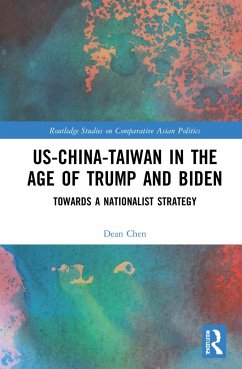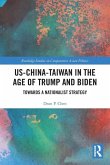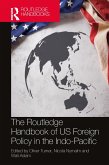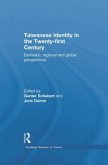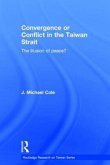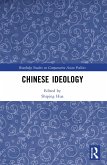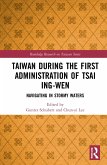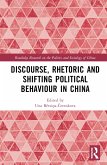This book explores U.S.-Taiwan-China relations during both the Trump and Biden administrations, revealing how policy changes under both presidents have impacted Washington's decades-long strategic policy framework for Cross-Strait Relations.
By tracing the continuities and changes of U.S. Strategic ambiguity and One-China Policy framework between the Trump and Biden administrations, the book assesses how the foreign policy prism, through which U.S. leaders view China and Taiwan, has experienced a distinct alteration and subsequently led to a policy adjustment. Utilising a wide range of documents and primary material, such as White House documents (ranging from the Clinton to the Biden administrations) in conjunction with interviews with Taiwan officials, this volume brings a detailed portrait of past, present, and potential future U.S.-Taiwan-China relations. Moreover, it provides a succinct examination of U.S. foreign policy traditions such as internationalism, nationalism, and multilateral nationalism (providing a study of U.S.-China relations and policies from Nixon to Biden) and the resulting influence of such traditions on recent U.S. Cross-Strait policy.
Presenting a comprehensive study of both the Trump and Biden administrations approach to Taiwan, this will be a valuable resource for any scholar or student of U.S. Foreign Policy, U.S.-Taiwan-China Relations and Cross-Strait Relations.
By tracing the continuities and changes of U.S. Strategic ambiguity and One-China Policy framework between the Trump and Biden administrations, the book assesses how the foreign policy prism, through which U.S. leaders view China and Taiwan, has experienced a distinct alteration and subsequently led to a policy adjustment. Utilising a wide range of documents and primary material, such as White House documents (ranging from the Clinton to the Biden administrations) in conjunction with interviews with Taiwan officials, this volume brings a detailed portrait of past, present, and potential future U.S.-Taiwan-China relations. Moreover, it provides a succinct examination of U.S. foreign policy traditions such as internationalism, nationalism, and multilateral nationalism (providing a study of U.S.-China relations and policies from Nixon to Biden) and the resulting influence of such traditions on recent U.S. Cross-Strait policy.
Presenting a comprehensive study of both the Trump and Biden administrations approach to Taiwan, this will be a valuable resource for any scholar or student of U.S. Foreign Policy, U.S.-Taiwan-China Relations and Cross-Strait Relations.
'Professor Chen has applied his command of existing literature and proven skills in carefully crafted and clearly written scholarship to go beyond available publications in this comprehensive assessment of the actions and motives of the two most recent US presidents regarding the sensitive issues involved in US-Taiwan-China relations.' - Professor Robert Sutter, George Washington University, USA.
'Professor Chen lucidly traces the United States's gradual movement away from a liberal internationalist foreign policy and toward a more nationalistic direction. He argues that, while America's One China Policy has become increasingly anachronistic and untenable by changing political and security realities, it has maintained an anchoring function that, if abandoned, risks escalating into more serious Sino-American collisions.' - Professor June Teufel Dreyer, University of Miami, USA.
'Chen offers a clear and cogent analysis of changing U.S. policy toward China and Taiwan. Chen argues that U.S. Taiwan Strait policy is a result of an inward-looking "Jacksonian" nationalism and a U.S. Congress increasingly disillusioned with 'constructive engagement' with Beijing. His analysis of the movement away from a liberal internationalist U.S. foreign policy tradition toward a more nationalist direction finds that, as U.S.-PRC relations grow more conflictual and Washington renounces liberal engagement with China, the changing security and political realities challenge the maintenance of America's venerable OneChina/strategic ambiguity policy.' - Elizabeth Larus, University of Mary Washington, USA.
'Dean Chen has once again produced a theoretically rich and empirically concise treatment of US-China relations that tracks the ideational shift in US strategic interests and policy perspectives from Obama to Trump and now Biden. Few scholars have so elegantly chronicled the transition of American foreign policy from Wilsonian liberal internationalism of the Post-War era to what appears to be an emerging Jacksonian nationalism.' - Hans Stockton, University of St. Thomas Houston, USA.
'Professor Chen lucidly traces the United States's gradual movement away from a liberal internationalist foreign policy and toward a more nationalistic direction. He argues that, while America's One China Policy has become increasingly anachronistic and untenable by changing political and security realities, it has maintained an anchoring function that, if abandoned, risks escalating into more serious Sino-American collisions.' - Professor June Teufel Dreyer, University of Miami, USA.
'Chen offers a clear and cogent analysis of changing U.S. policy toward China and Taiwan. Chen argues that U.S. Taiwan Strait policy is a result of an inward-looking "Jacksonian" nationalism and a U.S. Congress increasingly disillusioned with 'constructive engagement' with Beijing. His analysis of the movement away from a liberal internationalist U.S. foreign policy tradition toward a more nationalist direction finds that, as U.S.-PRC relations grow more conflictual and Washington renounces liberal engagement with China, the changing security and political realities challenge the maintenance of America's venerable OneChina/strategic ambiguity policy.' - Elizabeth Larus, University of Mary Washington, USA.
'Dean Chen has once again produced a theoretically rich and empirically concise treatment of US-China relations that tracks the ideational shift in US strategic interests and policy perspectives from Obama to Trump and now Biden. Few scholars have so elegantly chronicled the transition of American foreign policy from Wilsonian liberal internationalism of the Post-War era to what appears to be an emerging Jacksonian nationalism.' - Hans Stockton, University of St. Thomas Houston, USA.

